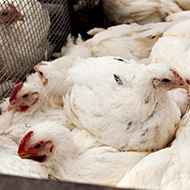
Protection and surveillance zones have been placed around the affected premises.
Two further cases of highly pathogenic (HPAI) avian influenza were identified in Suffolk over the weekend, Defra has confirmed.
Avian influenza H5N1 was confirmed in birds at premises near Market Weston on Sunday (12 March). The disease was also identified in commercial poultry at a second premises near Redgrave the day before.
Defra said that protection and surveillance zones of three and 10km have been placed around the affected premises and that all birds will be humanely culled.
The announcement comes as the UK faces its largest-ever bird flu outbreak, and brings the total number of confirmed UK cases in England since October 2021 to 85.
Chief vet Christine Middlemiss said: “We have taken swift action to limit the spread of the disease, including introducing housing measures. However, we are still seeing a number of bird flu cases both on commercial farms and in backyard birds right across the country.
“Many poultry keepers have excellent biosecurity standards but the number of cases we are seeing suggests that not enough is being done to keep bird flu out. Whether you keep just a few birds or thousands you must take action now to protect your birds from this highly infectious disease.”
She continued: “The avian flu outbreak has not gone away and implementing scrupulous biosecurity remains absolutely critical. You must continue to regularly clean and disinfect your footwear and clothes before entering enclosures, stop your birds mixing with any wild birds and only allow visitors that are strictly necessary. It is your actions that will help keep your birds safe.



 The Federation of Independent Veterinary Practices (FIVP) has announced a third season of its podcast, Practice Matters.
The Federation of Independent Veterinary Practices (FIVP) has announced a third season of its podcast, Practice Matters.